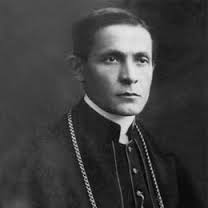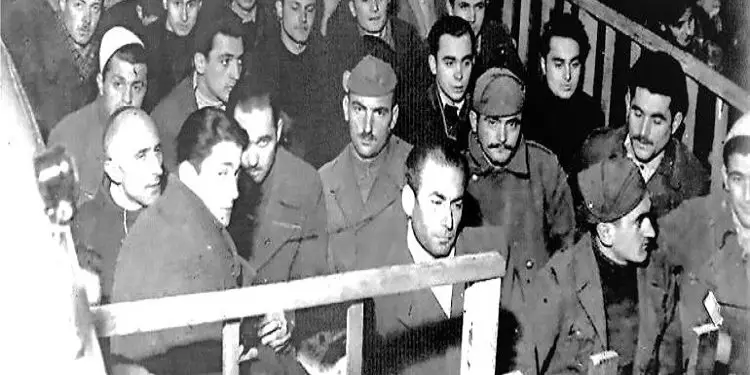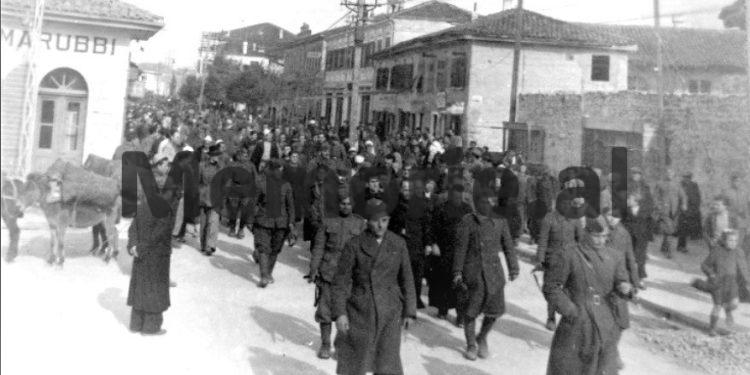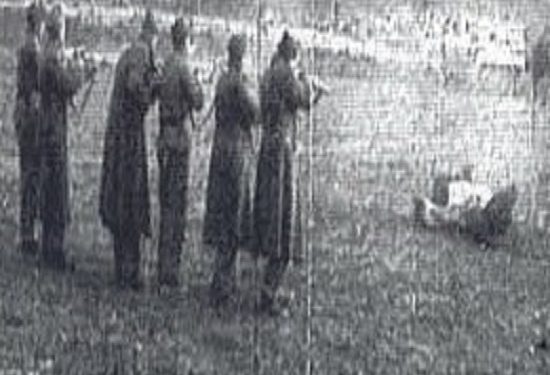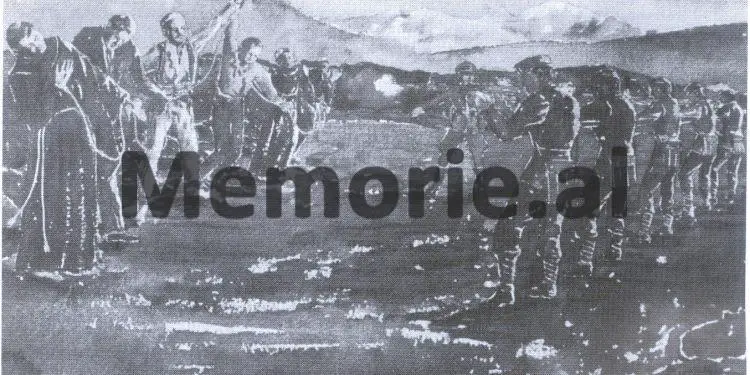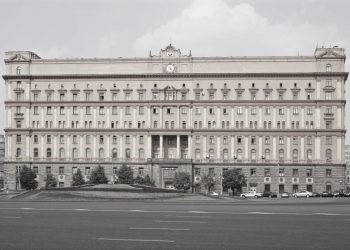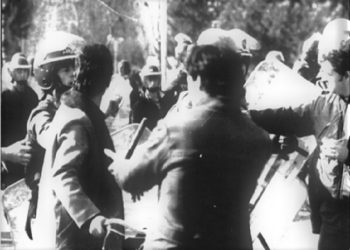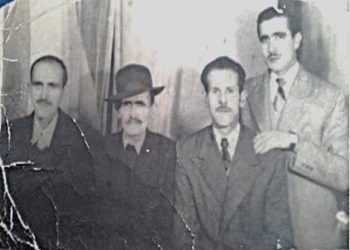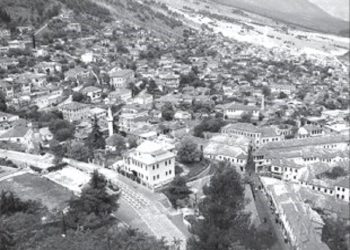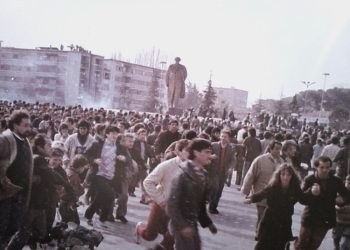Memorie.al/Monsignor Frano Gjini was in the ranks of those “rebel” priests who did not submit to the communist regime but stood stoically even before the firing squads, besides refusing to submit to Enver Hoxha, by not accepting to make the Catholic Church a tool in the hands of the power. The moments when Monsignor Frano Gjini fell under the regime’s focus, he had two choices: either to submit or to be eliminated at all costs. Here begins the drama of Monsignor Gjini.
Monsignor Gjini would be at the center of attention of the newly installed regime in Albania. This attention would begin in late 1945, when: “In the elections of December 2, 1945, Frano Gjini, the Abbot, dared and told the voting commission in Orosh flatly that I do not vote for a government whose primary strategy is the elimination of every religion…! I am a cleric in the service of the people and the Christian faith, for which I do not spare my life, just as for the Homeland,” writes historian Ndue Dedaj in the newspaper “Koha Jonë” on September 15, 1994.
Mons. Frano Gjini’s opposing stance was also noted when the Apostolic Delegate, Leone Nigris, who was forced to leave Albania (1945), transferred his function to Monsignor Gjini, as the Deputy Apostolic Delegate. Monsignor Gjini would be summoned to Tirana by Enver Hoxha and asked to sever contacts with the Vatican and to put his influence at the service of Enver Hoxha. Frano Gjini refused this. This is documented in the work of Markus Piters, “The Confrontation of the History of the Catholic Church in Albania 1919-1996,” and the works of Dr. Pjetër Pepa, dedicated to the Catholic Clergy, in two volumes, and “The Files of the Dictatorship.”
Testimony of Father Konrad Gjolaj, about Monsignor Frano Gjini:
“When Nigris left from here, he met with the Archbishop of Shkodër, Monsignor Gaspër Thaçi, and his secretary, Father Mark Hasi. Before leaving, Nigris left instructions that if he did not return; the competencies should be given to Monsignor Frano Gjini, the Abbot of Mirdita, in the capacity of Deputy Apostolic Delegate of the Vatican in Albania. A silent and modest man. He did not sit at the head of the place, not even when it belonged to him. He was a quiet man, a nature which was also liked by the Mirdita people, as it was combined with a shrewdness that was only understood after getting to know him closely.
Firm in word and slow, which made him indispensable in the regional assembly. He was proven to be an anti-communist with acts of bravery. When the Mirdita people proposed to escort him out of the homeland, so he wouldn’t fall into the hands of the communists, Monsignor Gjini replied: ‘No, because I cannot leave the people of Sh’Lleshdri in the hands of the communists.’ He remained here and performed the entrusted duty until the last day, just as he worked correctly throughout his life. Later, he was also proven in bravery.” This testimony is an excerpt from the work of Dr. Pjetër Pepa, “The Tragedy and Glory of the Catholic Clergy in Albania” – (Vol. II, 55, Tirana, 2007).
The newspaper “Koha e Re” – Organ of the Democratic Front of the Prefecture of Shkodër, on November 19, 1946, with the headline: “Sensational Discoveries in the Franciscan Convent,” writes, among other things; “A few days ago, in the Franciscan Convent and the Church of the Friars, some objects of great importance were discovered for the enlightenment of the people and for the unmasking of those who work against the people. Right in the middle of the Church, under the flagstones and under the altar, skillfully hidden by the reactionary forces, documents of the Gjonmarkajs were found (…) In the Convent room, documents of marked quislings were found, like Father Anton Harapi (…) In the lower room of the Convent, in the food depot and in the pigsty, hidden in the wall, in the ground, or in the ceiling, machine guns, ammunition, hand grenades, rifles, and others were found.”
December 11, 1946: The Second Major Blow
Weapons “discovered” in the church – The Franciscan Convent is seized. Arrested and tortured: Monsignor Frano Gjini, Monsignor Nikollë Deda, Father Mati Prennushi, Father Çiprian Nikaj, Father Pal Dodaj, Father Tomë Laca, Father Ndoc Sahatçija, Father Gjon Karma, Father Nikollë Shelqeti, Father Mëhill Miraj, Friar Zef Pllumi, etc. (…) The same invitation for salvation was extended to Monsignor Frano Gjini by the Mirdita fugitives, who loved and honored him so much, and the possibilities were very easy. But no! “I have no one to leave the believers and the Church of Saint Lleshdri to,” was the only answer – as written in the work of Dr. Pjetër Pepa, dedicated to the Clergy.
How was Frano Gjini arrested?!
Starting from what is called the ‘Postribë Movement,’ on September 9, 1946, a group of priests was also arrested, without taking any part in this movement, none of them. Arrested were: Frano Gjini, Monsignor Gjergj Volaj, Monsignor Nikollë Deda, and Father Tomë Lacaj. The arrest warrants do not contain concrete specifications, only general and vaguely defined matters.
The Public Prosecutor’s Office of the Prefecture, Security Section
Warrant – Prohibition contains: We, Hys Zaja, Public Prosecutor of the Pref. of Shkodër. Whereas Monsignor Frano Gjinaj, son of … and of …, aged 1886, from… with profession… with the following distinct bodily marks…. is suspected of the delict of undermining the Defense, committed on … and foreseen by sub ….
Orders his detention for an indefinite period and his confinement in Shkodër prison. Every armed force is entrusted with the execution of this order.
Shkodër, 18th, of the month XI, of the year 1946.
Public Prosecutor
Hys Zaja
What is striking in this badly written arrest warrant is that the motive for the arrest is stated as the crime: “undermining the Defense,” which is unclear what this means…?! Meanwhile, it seems clear that from the day of the arrest until the day of the indictment in early 1948, the State Security “worked” for two years to compile a file as convincing as possible for the “crimes” of Mons. Frano Gjini and the others who were arrested with him. The prosecutors and Security officers, and people who did not hesitate to lie supposedly as witnesses, diligently compiled minutes. Why did they lie? This is noted in the statement of Pjerin Kçira, a few months after the execution of Mons. Frano Gjini, Father Mati Prenushi, and Father Nikollë Deda.
Where the Security employee Pjerin Kçira changes his tune and goes from a party member to an “enemy of the party and enemy of the people,” telling the truth about the weapons in the Franciscan Church, where during the court sessions, he confessed remorsefully about what weighed on his shoulders, expressing himself before the judge with these words: “Do not think you can do with me what we did with the Catholic clerics, putting weapons in the church and forcing them through inhuman torture to admit they are theirs…! To cover up your vileness and that of Enver Hoxha, you want to condemn innocent people!” This statement of his brought out the truth about the weapons in the church. But it was too late because the martyrs of the faith were no longer in the cold prison cells, but in paradise.
The Trial in the Editorial Office of “Hylli i Dritës” (The Star of Light).
In December, they took him too, and I remained alone again. The prison now seemed to have few prisoners. There I was caught by the beginning of the year 1948, with such a great cold that even the mice came and went under my blanket, and several times, it happened to me to find them dead in the mattress in the morning; because I had accidentally crushed them while I was asleep.
On January 13, they brought me the indictment. This was formulated the same for 10 people. Monsignor Frano Gjini, Father Mati Prendushi – Provincial of the Franciscans, Monsignor Nikollë Deda, Father Tom Laca – secretary of the Archbishop, Father Ndoc Sahatçija, Father Mëhill Miraj, Father Nikollë Shelqeti, Father Mark Hasi, Friar Zef Pllumi, Zef Haxhia. The indictment consisted of 14 points, which more or less had this content:
All these are clerics of the Catholic Church, the center of world obscurantism throughout history. That they have served slave owners and all monarchs throughout the centuries. That they have caused many religious wars, the anti-Islamic Crusades, but also prepared the Night of St. Bartholomew in France. That they have hindered science and persecuted scientists, burning alive Galileo Galilei and Giordano Bruno. That they have actively collaborated with all empires to oppress the peoples.
That they have collaborated with the Ottoman Empire, to the detriment of the Albanian people. That they have collaborated with the Austro-Hungarian Empire and prepared its arrival. That they prepared the arrival of fascism. That they collaborated with King Zog, for the oppression of the Albanian people. That they prepared the Italian occupation on April 7, 1939, and that of German fascism. That they fought the National Liberation Movement. That they wanted to overthrow the People’s Power, etc., etc.
(…) After three days they came and took me. The first court session took place in the Editorial Office room of “Hylli i Dritës.” The Military Court Body arrived, if I am not mistaken, with these people: Mustafa Iljazi – Chairman, Anastasi and another one-armed officer, as members, Namik Xhemali – prosecutor (…)” – recalls Father Zef Pllumi.
A two-page letter, handwritten by Frano Gjini and signed by him, addressed to the High Military Court, to change the decision, claiming with arguments that he is innocent, but which was not taken into consideration and he was executed a few months later.
Addressed to the High Military Court
Tirana
I, the undersigned Monsignor Frano Gjini, Regent of the Apostolic Delegation in Albania. I have the honor to inform that P. T. High Court, I feel a sacred duty to object to the decision of the Military Court of Shkodër, given on 8.I. 1948, because this decision was given based on the indictment, issued by the Military Prosecutor of the Shkodër Military Office, on 2.I. 1948, which, as it is formulated, is not conformant to the truth regarding my person:
- That I have not worked for the arrival of Italian fascism in Albania;
- That I have not been a spy of Nazi-fascist imperialism;
- Nor have I worked for the fascization of the country;
- That I have never accepted my adhesion to the Italian occupation, with the exception of a telegram sent 22 days after the Italian occupation, together with the other colleagues of the Episcopate, which telegram has no other meaning than that of a convenience formality, forced by the historical fatality of the events of the time, prepared by others. Thus all the representatives of the civil, military, and religious rites of our country acted;
- That I have not extinguished the national patriotic sentiments of the people;
- That I have never placed any serious obstacle to the elimination of the National Liberation Movement;
- That I have not aided the Quisling Governments in any way;
- That I have never aided anyone to hinder the resistance of the people against the occupier … nor the formation of Bashi-bazouks against the National Liberation;
- That after the liberation I have not organized, participated in, or led any anti-popular political group, with the aim of overthrowing the Power by violence, nor have I tasked any clerical or civil person to represent me in such groups if they existed;
- That I have never addressed memoranda of a foreign imperialist character;
- That I have never had any contact, illegal or with the internal and external reaction.
Therefore, in connection with what you say, I feel it my national, social, and professional duty and conscience to request, based on justice… that of the … Court, the review of the trial, the annulment of its decision, and the recognition of my innocence.
In accordance with my request …. I sign with respects
Shkodër. 10. I. 1948
Frano M. Gjini
Regent of the Apostolic Delegation in Albania
Torture and Execution!
The Chairman read the long and protracted decision formulated with those convincing proofs that usually fall to all the executioners of the world:
- Monsignor Frano Gjini, death by firing squad.
- Father Mati Prendushi, death by firing squad.
- Monsignor Nikollë Deda, death by firing squad.
- Father Tom Laca, life imprisonment.
- Father Donat Kurti, life imprisonment.
- Ndoc Sahatçija, 15 years in prison.
- Father Mëhill Miraj, 10 years in prison.
- Father Mark Hasi, 7 years in prison.
- Zef Haxhia, 5 years in prison.
- Father Nikoll Shelqeti, 3 years in prison.
- Zef Pllumi, 3 years in prison.
- Anton Muzaj, conditional release.
While he was awaiting execution, according to testimonies, it is said that: (…) the time of his martyrdom (Monsignor Frano Gjini) arrived very quickly. The new regime arrested Gjini after the publication of his letter, in which he denounced the smear campaign and the persecution of the Catholic Church. The police who interrogated him tied his mouth and head with electric wires. They tortured him with electric shocks, and then they cut and salted his body, and even threw wooden splinters under his fingernails and toenails. Finally, the execution squad ended the life of the Bishop, in a muddy puddle in the vineyard plots of Bardhaj (near Shkodër). He was executed with 18 clerics and laypeople, on the morning of March 8, 1948.
Who was Frano Gjini?
Born on February 20, 1886, in the city of Shkodër, he showed an early desire to become a priest. In 1903, he completed his secondary education at the Saverian College, while he completed his higher studies in theology at the seminary of the Congregation for the Propagation of the Faith in Rome. On June 28, 1908, he was ordained a priest, serving as a parish priest in Krujë, Vlorë, and Durrës. On June 29, 1930, he was elected Bishop of the Abbey of Mirdita in Orosh, where the Abbot had great importance for the Mirdita people; on July 3, 1930, he was appointed Titular Bishop of Semta. On October 28, 1930, he was consecrated Bishop. For special merits in favor of Albania, on June 11, 1942, the Royal Governor in Tirana awarded him the “Skanderbeg” Order.
Thus, in March 1948, he was executed together with other clerics, who had been convicted on the false accusation of hiding weapons in the Franciscan Church. On November 14, 1993, he was awarded the title (posthumously) “Martyr of Democracy” by the then President of Albania. Furthermore, the founder of the First Catholic Church in the USA, Mons. Zef Oroshi, once secretary to Mons. Gjini, kept photos of Bishop Gjini in the church hall and his library as a sign of honor and respect,” is written in the work of publicist and researcher Tomë Mrijaj, “A Life Dedicated to Faith and Homeland – Mons. Zef Oroshi.” Frano Gjini, who himself held a Doctorate in Theology, attached particular importance to the encouragement and support of science, as well as the provision of church scholarships for talented young Albanian theologians. Memorie.al





